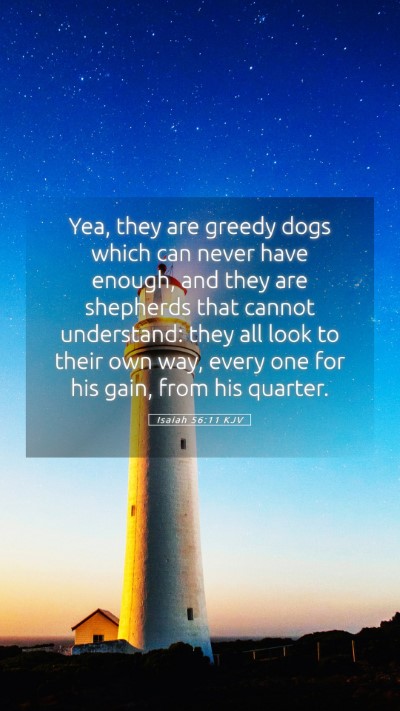Bible Verse Meaning of Isaiah 56:11
This commentary provides an in-depth analysis of Isaiah 56:11, combining insights from renowned public domain commentaries such as those by Matthew Henry, Albert Barnes, and Adam Clarke. This verse, located in the Old Testament, presents themes that are crucial for understanding both the historical and spiritual context within the Bible.
Text of Isaiah 56:11: "Yea, they are greedy dogs which can never have enough, and they are shepherds that cannot understand: they all look to their own way, every one for his gain, from his quarter."
Contextual Overview
To understand Isaiah 56:11 properly, it is vital to consider the surrounding verses as well as the historical context of Isaiah's prophecies:
- Historical Context: Isaiah prophesied during a tumultuous period for Israel, where leaders often misled the people.
- Moral Decay: This verse highlights the moral and spiritual decay observed among the leaders of Israel.
- God’s Judgment: It serves as a warning about the consequences of selfishness and greed among spiritual leaders.
Verse Analysis
Greedy Dogs
Matthew Henry describes the "greedy dogs" as a metaphor for unspiritual leaders who take advantage of their positions. They are characterized by an insatiable desire for material gain and power.
Shepherds That Cannot Understand
Albert Barnes notes that shepherds symbolize spiritual leaders. This lack of understanding signifies a failure to shepherd the flock correctly, leading them astray.
Self-Interest
Adam Clarke emphasizes that the phrase "every one for his gain" reveals how these leaders prioritize their selfish interests over the well-being of their followers, demonstrating a betrayal of divine responsibility.
Key Themes
- Selfishness in Leadership: The verse poignantly critiques the tendency of leaders to pursue personal gain at the cost of their duties.
- Warning Against False Prophets: The description serves as a cautionary tale against those who claim to lead but fail to understand spiritual truths.
- Accountability: It stresses accountability for those who hold positions of authority within the community.
Application of Isaiah 56:11
Understanding Isaiah 56:11 is not just an exercise in biblical exegesis; it has practical implications for modern readers:
- Evaluating Leadership: Believers are encouraged to critically evaluate their spiritual leaders and demand integrity and genuine stewardship.
- Personal Reflection: The verse serves as a reminder to assess our own motives in ministry and leadership roles.
- Desire for Genuine Faith: It provokes thought on what genuine faith looks like beyond selfish ambition.
Cross References
Several other scriptures resonate with the themes found in Isaiah 56:11:
- Jeremiah 23:1-2: A prophetic warning against negligent shepherds.
- Ezekiel 34:2-4: God’s condemnation of unfaithful shepherds and his promise to replace them with righteous leaders.
- Matthew 7:15: Jesus’ admonition to beware of false prophets.
Conclusion
The examination of Isaiah 56:11 offers profound insights into biblical verse meanings and interpretations, shedding light on the importance of integrity in leadership within both religious and secular frameworks. By applying these lessons to our lives, we can ensure that we strive for authenticity and responsibility in our spiritual journeys.


